Extract from L'Immoraliste (1902) by Gide
Part I, Chapter IV
First the original version then, in orange, my translation.
"Marceline, cependant, qui voyait avec joie ma santé enfin revenir, commençait depuis quelques jours à me parler des merveilleux vergers de l’oasis. Elle aimait le grand air et la marche. La liberté que lui valait ma maladie lui permettait de longues courses dont elle revenait éblouie ; jusqu’alors elle n’en parlait guère, n’osant m’inciter à l’y suivre et craignant de me voir m’attrister au récit de plaisirs dont je n’aurais pu jouir déjà. Mais, à présent que j’allais mieux, elle comptait sur leur attrait pour achever de me remettre. Le goût que je reprenais à marcher et à regarder m’y portait. Et dès le lendemain nous sortîmes ensemble.
Elle me précéda dans un chemin bizarre et tel que dans aucun pays je n’en vis jamais de pareil. Entre deux assez hauts murs de terre il circule comme indolemment ; les formes des jardins, que ces hauts murs limitent, l’inclinent à loisir ; il se courbe ou brise sa ligne ; dès l’entrée, un détour vous perd ; on ne sait plus ni d’où l’on vient, ni où l’on va. L’eau fidèle de la rivière suit le sentier, longe un des murs ; les murs sont faits avec la terre même de la route, celle de l’oasis entière, une argile rosâtre ou gris que le soleil ardent craquelle et qui durcit à la chaleur, mais qui mollit dès la première averse et forme alors un sol plastique où les pieds nus restent inscrits. – Par-dessus les murs, des palmiers. A notre approche, des tourterelles y volèrent. Marceline me regardait.
J’oubliais ma fatigue et ma gêne. Je marchais dans une sorte d’extase, d’allégresse silencieuse, d’exaltation des sens et de la chair. A ce moment, des souffles légers s’élevèrent ; toutes les palmes s’agitèrent et nous vîmes les palmiers les plus hauts s’incliner ; - puis l’air entier redevint calme, et j’entendis distinctement, derrière le mur, un chant de flûte. –Une brèche au mur ; nous entrâmes.
C’était un lieu plein d’ombre et de lumière ; tranquille, et qui semblait comme à l’abri du temps ; plein de silences et de frémissements, bruit léger de l’eau qui s’écoule, abreuve les palmiers, et d’arbre en arbre fuit, appel discret des tourterelles, chant de flûte dont un enfant jouait. Il gardait un troupeau de chèvres ; il était assis, presque nu, sur le tronc d’un palmier abattu ; il ne se troubla pas à notre approche, ne s’enfuit pas, ne cessa qu’un instant de jouer. Je m’aperçus, durant ce court silence, qu’une autre flûte au loin répondait. Nous avançâmes encore un peu, puis : « Inutile d’aller plus loin, dit Marceline ; ces vergers se ressemblent tous ; à peine, au bout de l’oasis, deviennent-ils un peu plus vastes… Elle étendit le châle à terre : -Repose toi. »
Combien de temps nous y restâmes ? je ne sais plus ; - qu’importait l’heure ? Marceline était près de moi ; je m’étendis, posais sur ses genoux ma tête. Le chant de flûte coulait encore, cessait par instants, reprenait ; le bruit de l’eau… Par instants une chèvre bêlait. Je fermai les yeux ; je sentis se poser sur mon front la main fraîche de Marceline ; je sentais le soleil ardent doucement tamisé par les palmes ; je ne pensais à rien ; qu’importait la pensée ? je sentais extraordinairement…
Et par instants, un bruit nouveau ; j’ouvrais les yeux ; c’était le vent léger dans les palmes ; il ne descendait plus jusqu’à nous n’agitait que les palmes hautes.
Le lendemain matin, dans ce même jardin je revins avec Marceline ; le soir du même jour j’y allai seul. Le chevrier qui jouait de la flûte était là. Je m’approchai de lui, lui parlai. Il se nommait Lassif, n’avait que douze ans, était beau. Il me dit le nom de ses chèvres, me dit que les canaux s’appellent séghias ; toutes ne coulent pas tous les jours, m’apprit-il ; l’eau, sagement et parcimonieusement répartie, satisfait à la soif des plantes, puis leur est aussitôt retirée. Au pied de chacun des palmiers un étroit bassin est creusé qui tient l’eau pour abreuver l’arbre ; un ingénieux système d’écluses que l’enfant, en les faisant jouer, m’expliquer, maîtrise l’eau, l’amène où la soif est trop grande."
Le lendemain matin, dans ce même jardin je revins avec Marceline ; le soir du même jour j’y allai seul. Le chevrier qui jouait de la flûte était là. Je m’approchai de lui, lui parlai. Il se nommait Lassif, n’avait que douze ans, était beau. Il me dit le nom de ses chèvres, me dit que les canaux s’appellent séghias ; toutes ne coulent pas tous les jours, m’apprit-il ; l’eau, sagement et parcimonieusement répartie, satisfait à la soif des plantes, puis leur est aussitôt retirée. Au pied de chacun des palmiers un étroit bassin est creusé qui tient l’eau pour abreuver l’arbre ; un ingénieux système d’écluses que l’enfant, en les faisant jouer, m’expliquer, maîtrise l’eau, l’amène où la soif est trop grande."

"The clown and the flute"
Lithograph by Chagall
"For the last few days however, Marceline, who was watching with joy my health finally return, had started talking to me about the wonderful groves of the oasis. She loved the fresh air and walking. My illness had provided a certain liberation leaving her free to go for walks from which she returned elated. Up until then she had said very little about this, fearing that I might be tempted to follow her or be disheartened by her talk of pleasures that, as yet, were still beyond me. But now I was getting better she was relying on the appeal of these excursions to complete my recovery. I was being carried along by my renewed enjoyment of walking and watching. The very next day we went out together.
She led the way along a strange path the like of which I had never seen before in any country. The path ambles its way indolently between two fairly high terracotta walls that borders gently sloping gardens ; from the start it twists and turns and sometimes it seems to just stop ; a deviation will soon cause you to go astray and you no longer know where you have been or where you are going. Always close, the river skirts one of the walls, which are made with the same earth as the road and the oasis as a whole : a pinkish-grey clay that the blistering sun causes to crack, that hardens in the heat but then softens again with the first drop of rain when it becomes soft and malleable enough for naked feet to leave their imprints. – Above the walls, palm trees. Our arrival causes turtledoves to take flight. Marceline looked at me.
I forgot my fatigue and my discomfort. I was walking in a state close to ecstasy almost, of quiet joy, of exaltation of the flesh and the senses. A light breeze was picking up, stirring the palm trees and we watched as the tallest of the palms swayed backwards and forwards. Then the air became calm again and I could quite distinctly hear the sound of a flute coming from behind the wall. – A gap in the wall tempted us in.
It was a place full of light and shade ; a tranquil place where time stood still. A place full of the sound of silence, rustling, streams quietly watering the palms, and, escaping from one tree to the next, the discreet cooing of turtledoves. A child was playing a flute. He was tending a herd of goats. He was sitting down, almost naked, on the trunk of a fallen palm tree. As we approached, he didn’t get up. He didn’t run away. Only for a moment did he stop playing his flute.
During this short silence, I noticed that another flute could be heard answering in the distance. We went further into the grove, then Marceline said : “There’s no point in going any further, the groves all look the same, maybe they get a bit bigger near the end of the oasis.” She spread the shawl out on the ground. “Rest a while.”
How long did we stay there ? I don’t know – what did time matter ? Marceline was at my side ; I lay back and rested my head on her knees. The flute music flowed once more, stopping for a moment here and there before starting again ; the sound of water… From time to time a goat bleated. I closed my eyes ; I felt Marceline’s cool hand resting on my forehead ; I felt the hot sun gently filtered by the palms ; I wasn’t thinking of anything ; why bother thinking ? I felt extraordinarily…
Then, from time to time, a new sound ; I opened my eyes ; a light wind too high to disturb us, played with the tops of the palms.
Lithograph by Chagall

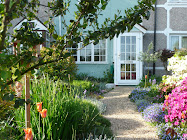


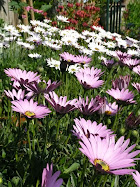
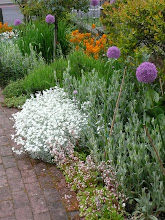



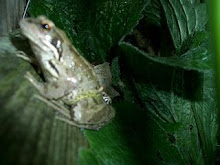
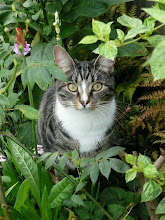
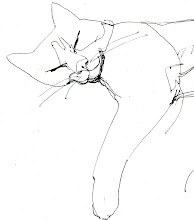



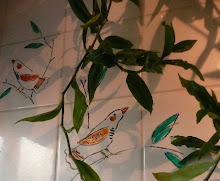
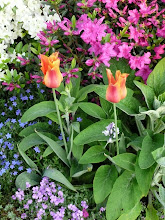




2 comments:
It has just been brought to my attention that there are two Marcelines in the opening sentence of my translation of this extract from L’Immoraliste by Gide, whilst, of course, the name is only used once in the original. This is not a typing mistake. I’ve reused the name because of the long insertion (about Marceline’s delight at seeing her husband’s recovery), which distances the verb from its subject. Possibly a risky decision, especially as it comes at the beginning of the extract, where it is more visible. But I’ve decided to go with it not least because Michel himself has a tendency to use repetition and anaphors.
Further on, at the end of the third paragraph, I’ve taken another liberty by translating “Une brèche au mur ; nous entrâmes” as “a gap in the wall tempted us in.” Again, this decision came after some reflection. Perhaps I’ve been too free with the original here. But for me much of the sensuality of this text is inferred by the use of sparse and equivocal language. I am presently reading a new translation of Gide’s text by David Watson, published by Penguin. The translation reads ok but a lot of the sensuality and the controversial allusions regarding the narrator’s awakening sexuality have been washed out by this translation, which updates the language and in so doing, tones down much of the innuendo. For example, in the Penguin version, the translator has chosen to translate “garcon” and “enfant” as “lad”. The problem here is that “lad” connotes a male of any age from 8 to 80. The boy is no longer a child. This is why I’ve decided in my translation to describe the goatherd boy (a boy of 12) as “beautiful” ; in the French version he is of course described as “beau”, which in the Penguin version is correctly (at a semantic level) translated as “handsome”. For me, “handsome” like “lad” is evocative more of males of any age whilst “beautiful” is more suggestive of children, of young boys, or of effeminate men. Coming from a male speaker describing, in the context of such a sensual novel, a young boy, “Beautiful” is more ambiguous. It’s precisely this ambiguity, which, for me at least, is no longer present in the Penguin translation. It’s a pity because this is a beautifully written text, with some truly lyrical passages, as this extract shows. Nevertheless, close reading of L’Immoraliste does allow us to at least understand why this work by Gide scandalized so many of his contemporaries when today it can seem quite “tame”.
Since my last comment I've had an opportunity to review my original translation. Keen-eyed readers will notice I've made a few modifications.
Post a Comment